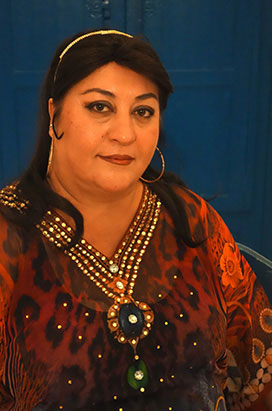Farida Mohammad Ali – Iraq The Voice of Maqâm
Night inthe Medina III
Wednesday 11 May
Prefecture Hall, Batha (opposite the Batha Museum) – 21.30
Farida Mohammad Ali – Iraq
The Voice of Maqâm
Although it was only towards the end of the 18th century that current Iraqi maqâm was defined, one still dreams of the sumptuous epoch of the Abbassids of the 8-13th centuries. Lying at the heart of the ancient land of Mesopotamia, Baghdad – the country between the two rivers, the Tigris and the Euphrates – was home to a universal Islam within the confines of the Arab world, both Turkish and Persian. This is still seen in the tchâlghî baghdâdi ensembles.
These ensembles are principally characterised by their use of the santûr, a hammered dulcimer similar to that used in Persian tradition, and the djôza (the name of the soundbox made of coconuts, djôz al-hind, or ‘Indian nut’), a four-stringed fiddle which is today replaced less than satisfactorily with a western violin. These two instruments of great acoustic delicacy give the Iraqi tradition an enigmatic perfume of the far-off Orient.
The term maqâm (literally a location or place) refers to a type of music possessed of a particular mood or feeling. In the classical music tradition of Iraq, it means simply a song which masterfully develops a wide range of emotions through its 23 modes. After a short instrumental prelude known as the muqadimma, the art of the qârî (singer or reciter) consists of delivering some rich verses in the tradition of the qasida, a type of Arab poetry that continues to inspire great contemporary poets.
Farida Mohammad Ali was born in Kerbela, a mythical Shi’a village in southern Iraq, where the tradition of women singers was permitted. Accompanied by her tchâlghî baghdâdi ensemble, she expresses the refinement of the ancient courts as well as a rich popular repertoire.


